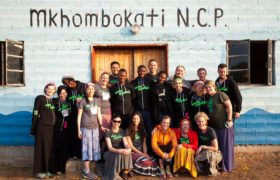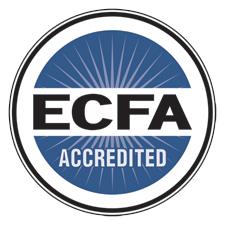Our mission teams swoop into Mkhombokati CarePoint, all bells and whistles blowing, ready to put on a show and sing and teach. Our short-term teams come with supplies and songs and the simple gift of making good on the promise of showing up, just as the teams before us have and the teams that follow us will.
We certainly go with intention and plans and purpose, working to ensure that the activities of our specific short-term mission fit into the long-term goals of the Swaziland ministry at Capital Church and the strategic development goals of the HopeChest Swaziland field staff.
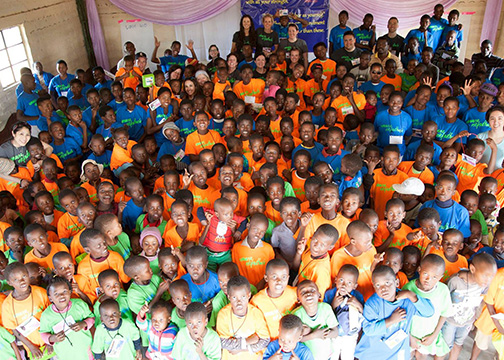
Our teams have just a few hours during each of five days to build and strengthen relationships through loving on and laughing with the children. There are only so many finite minutes to hug and hope and help. In an instant, we pack up our three rings, zip and clip up our bags and roll out of town. We cringe at what feels like a tearing of us from them, as the bus bumps down the road on that last day, now familiar faces waving and fading behind us.
In the grief and the pain of good-bye, God dresses our wounds with the peace of knowing that our little flock will be well looked after. And that’s because they have a shepherd. Two shepherds, actually. Their names are Mbuso and Zama. (Shepherds are active participants in the Swaziland Leadership Academy who are serving the children on a daily basis for a two-year term at their respective CarePoint.)
The HopeChest ministry (together with Adventures in Missions) operates 33 CarePoints and serves over 6,000 children. But they are not primarily a relief or aid organization. One would think, amidst such intense poverty, that aid would be, by default and necessity, a constant priority. And yes, of course, there are gardens and farms and projects designed to supply food for all those children five days a week. And yes, there are building projects designed to improve the function of the CarePoints’ purpose. And yes, there are garages full of underwear and socks and items to replace the clothes whose holes no longer provide cover. There are statistics related to all of these. But they aren’t the ones that matter most.
At the heart of this ministry lies one word: development. The seat of the ministry’s emotion and passion and the place from which it both groans and rejoices is not from providing stuff, but from serving and shaping souls through discipleship and development.
The book When Helping Hurts defines development as the “process of ongoing change that moves all the people involved—both the ‘helpers’ and the ‘helped’—closer to being in right relationship with God. It is a process that people do with each other, not simply for each other.” Our western culture is quick to measure mission trip success with checklists and the pounds and piles of things. It feels good to hand out a shiny new pair of shoes to a barefoot child. A photo of this does wonders to market a ministry. But let’s be careful to catch ourselves in the trap of overvaluing the giving of stuff and focus instead on hard conversations that focus on development. Let’s wrestle with how and what and where our time is truly most valued and aligned with the overall ministry vision.
The dedicated field staff, CarePoint leaders and Shepherds have made this ministry about a single noun: people; and about all kinds of verbs, like training and equipping and empowering and coaching. Their ultimate pot of gold is to raise up Swazis to care for their own out of a place of knowledge of and abundance in the Lord’s kingdom, not out of the fear that comes from the despondent cycle of scarcity on this earth.
There are many examples of how this strategy is being executed throughout the ministry:
Sisekelo Setfu
The Swazi staff, with the assistance of a South African counselor and curriculum developer, wrote and developed this custom discipleship curriculum that is taught daily to the children at each CarePoint.
Ngesikhatsi
Ngesikhatsi is a custom grief counseling program that takes small groups of children through intense personal sessions, teaching them how to express and process their unimaginable grief and loss, putting them on a path to freedom and forgiveness. (Forty-seven children at Mkhombokati have been blessed by this program.)
Sports Ministry (for the fatherless)
An amazing bunch of exuberant young men travel to CarePoints throughout the month, offering life coaching through soccer. They teach a custom curriculum that pairs life-skills such as courage in conjunction with soccer skills. They work to simultaneously raise up boys in sport and reach out to the fatherless.
Shepherds and the Swaziland Leadership Academy
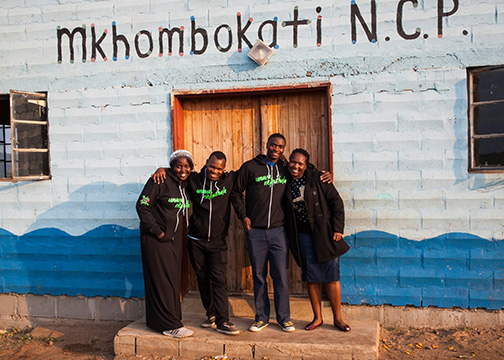
It is the Shepherds, born out of the Swaziland Leadership Academy (SLA) that are the heartbeat of this ministry.
Each year, the Swazi staff select a small (10 to 15) group of young men and women who show initiative and interest directly from the CarePoints to become SLA students. The students then spend eight months in South Africa at a leadership school where they are intensely poured into, coming face-to-face with their own past, their own pain and their own stories, sifting beauty from the ashes and finding the faithfulness of God.
SLA students are transformed, tended to as people and trained as leaders, emerging from this journey of spiritual formation ready to discern and execute.
Upon their return to Swaziland, each student is assigned a CarePoint to which he or she becomes its Shepherd. They are also given a crash course on managing attendance spreadsheets and all the foreign minutiae of administration that CarePoint management demands. There, they serve the children after school four days a week, acting as big a brother or sister, as a mother and/or father, as a disciplinarian and counselor and teacher and friend. In a land with 40% unemployment and omnipresent illness and death, these Shepherds are walking monuments, beacons of hope to thousands of children.
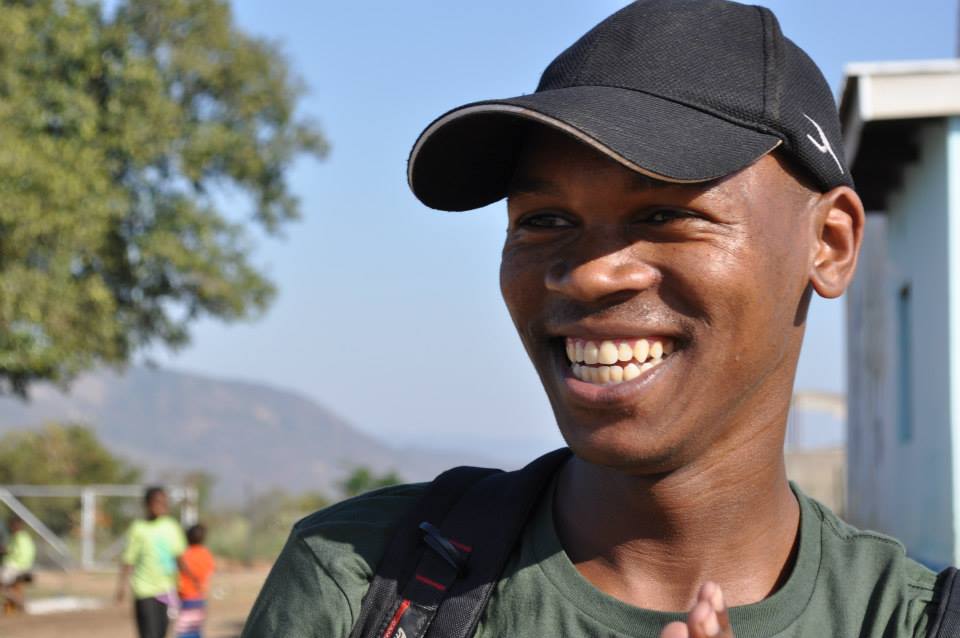 Mbuso is our veteran Shepherd. His smile is magnetic, with a transcendent gravitational pull. Mbuso’s mind dwells on what is true. He is curious and confident and wholehearted. He lives near the CarePoint, at the homestead where which he was born, a small concrete block with a bed and a lone light bulb. Our team was treated to dinner at his homestead, an evening under the stars that forever redefined hospitality in my playbook of practicing Christianity.
Mbuso is our veteran Shepherd. His smile is magnetic, with a transcendent gravitational pull. Mbuso’s mind dwells on what is true. He is curious and confident and wholehearted. He lives near the CarePoint, at the homestead where which he was born, a small concrete block with a bed and a lone light bulb. Our team was treated to dinner at his homestead, an evening under the stars that forever redefined hospitality in my playbook of practicing Christianity.
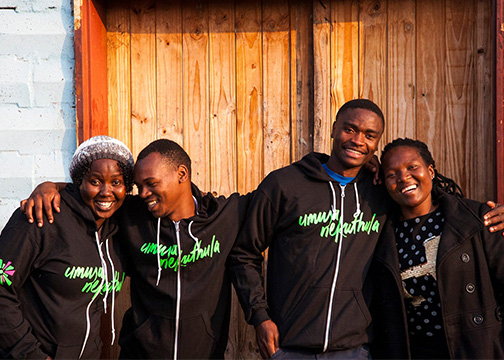
Zama (pictured on the left) is Mkhombokati’s new Shepherd. Her smile is soft and sweet and shy. She is gracious and tender and her gentleness is evident to all. She is approachable and encouraging and teachable. She embodies the Fruit of the Spirit.
First and second year Shepherds are volunteers; they do not get paid. They serve, making a daily difference in the lives of our special Mkhombokati friends even as I type. They give their time to raise the children of their country into good citizens of both the Kingdom of Swaziland and the Kingdom of the King of Kings.
Shauna Neiquist wrote, “Connection heals us more than achievement ever could.” And the Bible says, “Love one another as I have loved you.” The connection and love that Mbuso and Zama selflessly offer as living sacrifices inspire and encourage us all.
“And this is my prayer: that your love may abound more and more in knowledge and depth of insight, so that you may be able to discern what is best and may be pure and blameless until the day of Christ, filled with the fruit of righteousness that comes through Jesus Christ – to the glory and praise of God.” – Philippians 1:9-11

